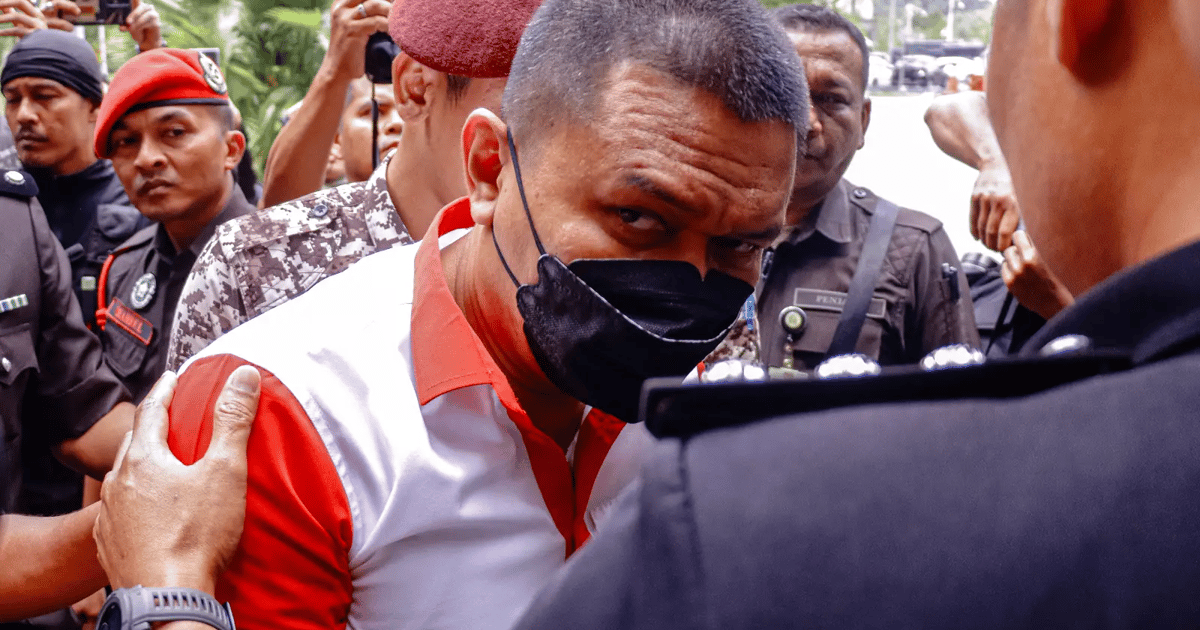
Azilah Hadri, one of the two former Special Action Unit (UTK) officers convicted for the murder of Mongolian Altantuya Shaariibuu 18 years ago, had his death penalty commuted to a 40-year jail term today.
In a magnanimous gesture, the deceased’s father, Shaariibuu Setev, had written a letter to the court in support of Azilah’s application.
A three-member Federal Court review panel chaired by Chief Justice Tengku Maimun Tuan Mat said it was allowing Azilah’s application for a commutation of his sentence to a prison term.
“We set aside the death sentence and substitute it with a jail term of 40 years that begins from the date of his arrest on Nov 1, 2006 but excluding the period the applicant was released by the Court of Appeal,” Tengku Maimun said.
Azilah, 48, was also ordered to be given the mandatory minimum 12 strokes of the rotan.

The court heard today that Altantuya was a foreign spy and that Azilah had received instructions from his superior to commit the crime as she possessed classified information about the country.
The top judge said the bench had given due consideration to Azilah’s affidavit and the letter from Altantuya’s family when allowing the review application.
“In our view, there are strong mitigating factors to apply the proportionality principle in sentencing. The death sentence is set aside and substituted with a 40-year jail term,” said Tengku Maimun.
Azilah’s case was brought under the Revision of the Sentence of Death and Imprisonment for Natural Life (Temporary Jurisdiction of the Federal Court) Act 2023, which gives judges the option of imposing a jail term instead of capital punishment in murder cases.
Also on the panel hearing the application were Justices Abang Iskandar Abang Hashim and Nordin Hassan.
At the outset of today’s proceedings, lawyer J Kuldeep Kumar, representing Azilah, sought to tender Shaariibuu’s letter to the court.
Lawyer Sangeet Kaur Deo, who held a watching brief for the family, confirmed its authenticity. Deputy public prosecutor Dusuki Mokhtar did not object to its admission into evidence.
Evidence in court revealed that Altantuya, 28, was murdered on Oct 18, 2006. Her body was then blown up using C4 explosives in a jungle in Puncak Alam on the outskirts of Shah Alam, Selangor.
In 2009, the Shah Alam High Court convicted Azilah and colleague Sirul Azhar Umar of the crime.
The convictions were overturned by the Court of Appeal in 2013, but restored by the Federal Court two years later. Both accused were sentenced to death. Sirul fled to Australia before the final verdict was announced, where he remains.
On Dec 8, 2020, a five-member apex court bench rejected Sirul’s review application which sought a retrial. The court said there had been no miscarriage of justice, breach of natural justice or violation of any written law.
Former political analyst Abdul Razak Baginda, a confidante of former prime minister Najib Razak, was charged with abetting Azilah and Sirul but was acquitted by the High Court in 2008 without his defence being called. The government did not appeal Razak’s acquittal.
Despite the conviction, the motive for the murder of Altantuya was never revealed.
During the trial, senior police officer Zulkarnain Samsudin testified that Sirul had confessed to shooting the victim before her body was blown up.
Another witness, investigating officer Tonny Lunggan, told the trial court that Razak had some time on Oct 16 or 17, 2006 sought the assistance of Musa Safri, then Najib’s aide-de-camp, as he was being harassed by Altantuya.
Musa despatched Azilah to meet Razak and offer assistance.
In one of his cautioned statements, Razak said Azilah, then a chief inspector, had told him he could “finish Altantuya off”, having done so on several other occasions in the past. However, Razak told Azilah not to go to that extent, fearing that her family would seek him out.
In his submission for commutation of the sentence today, Kuldeep said Azilah was a loyal officer who had followed Musa’s instructions in the interest of national security.
“Musa had informed him that he (Azilah) could take any officer with him for the covert operation as the deceased was a spy and threat to the nation’s security,” the lawyer said, adding that Altantuya was in possession of classified information.
Dusuki, assisted by DPP Yusaini Amer Abdul Karim, urged the bench to uphold the death penalty as the murder “shook the conscience of the society”.
“Altantuya was taken to a secluded spot where the gruesome murder took place. A forensic team had to be sent later to collect her remains for identification purposes,” he said.
After the proceedings, Sangeet told reporters the maximum custodial sentence imposed on Azilah was acceptable to Altantuya’s family.
“The father’s letter reveals that the family values the sanctity of life and the right to existence,” she said.






